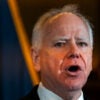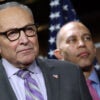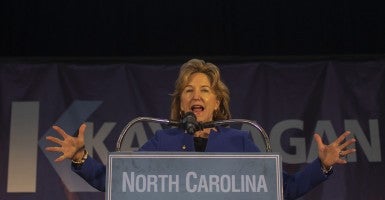In North Carolina’s U.S. Senate race, characterized by seemingly ubiquitous and accusatory ads, incumbent Democrat Kay Hagan touts herself as a moderate lawmaker willing to compromise.
She’s the “most moderate,” in fact, and she’s not afraid to say it.
Hagan, who surprised Republican stalwart Elizabeth Dole in 2008, faces state House speaker Thom Tillis as her Republican opponent this time around.
In February, National Journal ranked Hagan the Senate’s most moderate member, and she continues to make good use of that title in October and November.
Hagan tells voters its means she will work with anyone on either side of the aisle to further the interests of North Carolinians. Her opponents suggest it is her way of distancing herself from President Obama in the one swing state he failed to carry in his 2012 re-election campaign.
It’s safe to say Tar Heel State voters won’t see the president before the election. He is persona not grata among many fellow Democrats these days. He sticks to friendly venues and, with the exception of Mary Burke, who is running against incumbent Scott Walker in the Wisconsin gubernatorial race, to candidates with safe leads.
“President Obama is campaigning only where he can help — not hurt — Democratic candidates,” NPR reports. “That isn’t very many places. But it does include some governor’s races, like in Wisconsin.”
In an interview with NBC’s Kasie Hunt, Hagan was non-committal when Hunt asked whether Obama was an effective leader. Hagan, it seems clear, wants to distance herself from Tillis and Obama, Instead, the senator did welcomed Hillary Clinton for a rally Sunday in Charlotte.
John Dinan, a professor of politics at Wake Forest University in Winston-Salem, N.C., said Hagan is one of many Democratic candidates this year targeted by ads trying to link them to unpopular Obama policies such as the health care law and the stimulus legislation. It’s no different from 2006, when Democrats tried to link Republicans to President Bush and the Iraq War, he said.
Democrats have responded by distancing themselves, where possible, from Obama on issues such as the Keystone Pipeline. Another approach, which Hagan has employed, is to “shift the focus of the campaign from national issues to local issues, such as trying to link Republican candidates with controversial or unpopular state policies,” Dinan said.





























